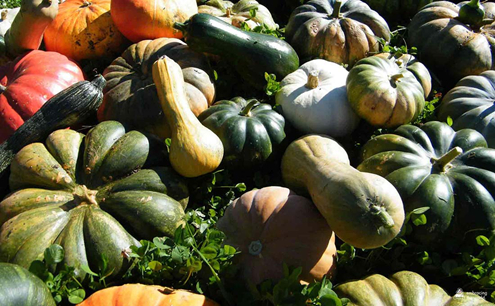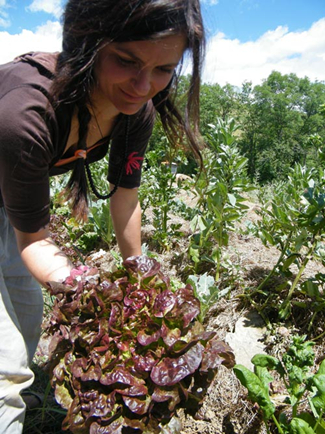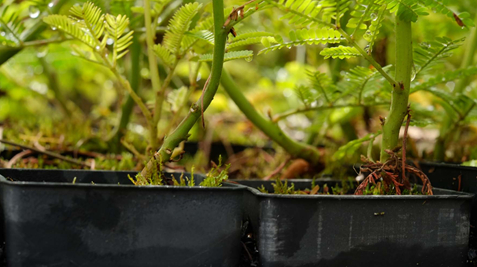
Home >> Newsletters > GreenFriends Newsletters > > Q4 2022 Newsletter
| Home | Source Reduction | Friends of Green Friends | Newsletters |
| Gardening | Resources | What You Can Do | Embracing The Trees |
| Making Informed and Responsible Food Choices to Protect the Environment |
 |
|
Climate change is on more and more people’s minds given the dramatic change in temperatures and rainfall seen this summer. Many of us are already thinking about ways we can live more sustainably. Food choices can have a significant impact on our environment, although many people don’t consider how directly these choices can impact climate change, loss of habitat, or water shortages. “Ignoring the current environmental situation is like a man on the top floor of flats* being indifferent to the fire on the ground floor.” - Amma (The word “flats” in India refers to apartments) Here are some ideas related to environmentally-friendly and long-term sustainable eating practices. |
Factors Influencing a Food’s SustainabilityWater ConsumptionAs water shortages around the world grow, the more water we conserve when buying, preparing, and eating food, the better. One of the largest consumers of water on the planet is meat production. "Many people talk a lot about environmental preservation, but true greatness lies in putting these principles into practice and actually doing something about it.” Amma In this article, Animal Agriculture’s Impact on Climate Change, according to data gathered by Climate Nexus from multiple research papers:
Beyond limiting or reducing meat and dairy consumption, one can also buy and use food made from “water wise” crops. Read more about food and water consumption facts at World Economic Forum and at the Food Revolution Network. Vegetables generally take less water to produce than fruits. Plants with deeper root systems take less water to produce than their counterparts. Certain beans, black eyed peas for example, and tomatoes, squash, melons, tomatoes and potatoes are some of the more 'water wise' produce options on the market. Surprisingly, some of the water-high foods we may be importing and eating on a regular basis include: almonds, avocados, rice and bananas. Consider researching and choosing low-water fruit and vegetable alternatives to eat, and skip the non-seasonal, highly imported ones. TransportationWhen we buy local and seasonal produce, we limit the distance it travels to reach us. Can we shop at a farmer’s market or join a community share at a local farm (first inquire about their water practices) where we can buy our produce? Buying local varieties of produce from our grocery stores supports both local farmers and reduces fossil fuels and emissions in the transportation of those goods over long distances and from overseas. Loss of Habitat and Deforestation"Nature is an indispensable part of life on Earth. Everything relies on nature to live. We are not different from nature; we are an interdependent part of it. Our lives depend on the well being of the whole. Therefore, it is one of our foremost duties to lovingly care for all living things." - Amma Certain foods we buy contribute to deforestation. Three main drivers of deforestation as outlined at 10 Myths About Deforestation, are meat production, growing soybeans to feed pigs and poultry for human consumption, and palm oil. Wood products are also a concern, in terms of paper and new furniture, as well as cocoa products such as cocoa powder. Per the World Wildlife Fund (WWF), palm oil, a product used in many foods we buy regularly, "has been and continues to be a major driver of deforestation of some of the world’s most biodiverse forests, destroying the habitat of already endangered species like the orangutan, pygmy elephant and Sumatran rhino". That being said, palm oil is actually more sustainable to produce than typical vegetable oil alternatives, and can be found in many foods under different names. Rather than entirely boycotting palm oil, purchase palm oil that has received the RSPO (Roundtable for Sustainable Palm Oil) certification. Otherwise, consider organic cooking oils including organic olive oil. BiodiversityThe WWF recommends we consider eating alternative sources of food, rather than commodities that may be overfarmed and overproduced. We could consider diversifying our plate to include fruits and vegetables, especially local ones, that contribute to a diverse food chain – and perhaps even divert waste. Kale stalks, for instance, can make a very tasty dish (e.g., sauteed kale greens), as could carrot greens such as in carrot green pesto. What could we use (ideally seasonal and local) that is different, and how can we reduce waste from what we already use? Could we grow some of our own food and practice crop rotation at home? |
 |
Packaging"What is needed today is that we begin to value Mother Nature as much as we value our own mother who gave birth to us." - Amma It always bears repeating that how our food is packaged, in addition to the factors above, can contribute to its overall sustainability. Think about the three R’s – can I reduce the packaging? If not, could I reuse the packaging? If I cannot, can I recycle it? Buying produce without using plastic bags is best. We can bring our own produce bags to the market and try to buy bulk with reusable containers. Some grocery stores offer bulk purchases of oil, honey, and more, where you can use and reuse containers How to Eat More SustainablyIn summary, when we select our food, consider:
Keeping the above questions in mind around water, transportation, seasonality, biodiversity, and packaging may help us make more sustainable choices in the present and over time. "Everything in the universe is interconnected. The universe is a net held by each of us. When there is movement in the corner of a net held by four people, it will reflect everywhere. All actions we perform knowingly or unknowingly, alone or as a group are being reflected in the corners of the universe. It will not work if we wait for others to change. Even if they do not change, we should be willing to change. We should see what we can do." - Amma |
 |
| Diksha Bali - Maryland |
Read a Response to the Water Bucket Challenge in the Q4 2022 Newsletter >>
| Home | Source Reduction | Friends of Green Friends | Newsletters | Resources | What You Can Do | Embracing The Trees |
For more information, e-mail info@greenfriendsna.org |
||||||